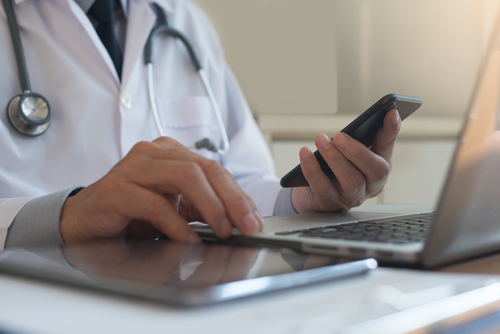Remote monitoring improves symptom outcomes in head and neck cancer
M3 Global Newsdesk Jun 11, 2018
Remote monitoring of patients with head and neck cancer (HNC) using mobile and sensor technology resulted in less severe cancer- and treatment-related symptoms, according to findings presented at the 2018 ASCO Annual Meeting in Chicago, IL.

The study was led by Susan K. Peterson, PhD, professor, department of behavioral science, The University of Texas MD Anderson Cancer Center, Houston, TX. It used the CYCORE (CYberinfrastructure for COmparative effectiveness Research) system, which remotely assessed patient weight, blood pressure, pulse, and self-reported outcomes during radiation treatment (RT). CYCORE was developed collaboratively by 4 institutions through a grant from the National Cancer Institute.
In this study, CYCORE included a Bluetooth-enabled weight scale, Bluetooth-enabled blood pressure cuff, and mobile tablet with a symptom-tracking app that sent information directly to a physician each weekday.
Clinicians reviewed the data daily to identify early risk for dehydration and to support early intervention for the improvement of symptom management. Patients using CYCORE were compared with those receiving usual care.
A total of 357 patients completed the 28-item MD Anderson Symptom Inventory at initiation of RT, completion of RT, and 6 to 8 weeks following RT completion. The survey covers common symptoms for patients with cancer, such as pain, fatigue, and nausea, as well as symptoms more specific to head and neck cancer, such as difficulty swallowing or chewing, skin pain/burning/rash, and problems with tasting food.
Participants were randomly assigned to CYCORE plus weekly doctor visits (n=169) or usual care (n=188), which consisted of weekly visits only. Symptom severity was recorded on a scale of 0 to 10, with zero being no symptoms or pain and 10 being the highest level of symptom severity.
Results showed that patients who used CYCORE had lower symptom severity than participants who had standard care.
The researchers stated that daily remote tracking of patient well-being enabled physicians to detect concerning symptoms early and respond more rapidly compared with usual care.
Initially, no difference was noted in self-reported health severity scores between the CYCORE participants and the usual care group. After completion of RT, the CYCORE participants had lower mean scores for general symptoms vs usual care participants (2.9 vs 3.4), as well as lower mean scores for symptoms specific to head and neck cancer (4.2 vs 4.8).
Six to 8 weeks after completion of therapy, CYCORE participants had a mean score of 1.6 for overall health, compared with 1.9 for the usual care group. Both groups had slightly higher severity scores for specific head and neck symptoms (1.7 vs 2.1).
Most patients (>80%) adhered to daily monitoring, which was an excellent outcome given the intensity of their treatments, stated Dr. Peterson. Scores reflecting how various symptoms interfered in activities of daily living were about the same in both groups across the entire time of survey reporting.
“Our study generated evidence on how newer technologies can be integrated into cancer care relatively easily and improve patient outcomes without interfering too much in a person’s daily life,” Dr. Peterson said. “This study was done during a rather intense period in the patients’ care for head and neck cancer. The system helped their physicians to provide valuable support that ultimately resulted in lower symptom severity.”
The authors noted that while participants varied greatly in age in the study, most participants were white. This reflected the overall head and neck cancer patient population at the cancer center.
The authors hope to implement CYCORE in a nonacademic center setting to better reflect where the majority of patients receive treatment.
The study received funding from the National Institutes of Health.
This story is contributed by Paul Basilio and is a part of our Global Content Initiative, where we feature selected stories from our Global network which we believe would be most useful and informative to our doctor members.
-
Exclusive Write-ups & Webinars by KOLs
-
Daily Quiz by specialty
-
Paid Market Research Surveys
-
Case discussions, News & Journals' summaries